- Home
- Ann Patchett
What Now? Page 2
What Now? Read online
Page 2
walked to gates by handsome young men.
The pleasure and the novelty of the experi-
ence were something I’d be sorry to miss.
? ? ? ? ? ? ? ? ? ?
2 5
He shook his head and took my shoulder bag. “What’s in here?” he said, sagging
beneath its weight. “Lead?”
“Actually, it’s zinc.” I had brought
home several zinc plates to etch for my printmaking class and I was regretting having
chosen quite so many. I asked him if he
worked at the airport. He didn’t look like a
guy who worked in the airport. He had on
jeans and deck shoes and a dark pink shirt
with the sleeves rolled back. He told me he
worked there after a fashion: he was a Hare
Krishna.
I stopped. Instantly, my good manners
fell into combat with my paralyzing fear, fear and manners being two things I had been
overburdened with in Catholic school. How
did one speak to a Hare Krishna? What did
2 6
one say? “Thanks anyway,” I said in a weak voice. “I can find it.”
“Find what?”
“The gate. I remember where it is
now.” Hare Krishnas very likely kidnapped
girls like me. They brainwashed them into
playing tambourines in public parks, made
them dance in circles and chant repetitive
songs. Thinking of this now it breaks my
heart: once the most dangerous person at an
airport was a lone Hare Krishna, trying to
convert the world to the ways of love and vegetarianism, or that joining a religious sect
meant you might have to play an undignified
instrument like the tambourine.
He sighed and went on ahead. “Don’t
be silly.”
I felt myself grow pale. He had my
suitcase. I looked around at the bustling
2 9
throng and thought of how there was always safety in numbers. I would walk along with
him a ways, not too close, and then I would
make my escape. If I lost the bag, so be it. It was not a high price to pay.
“So now you’re not talking,” he said as
we walked on and on. O’Hare is a huge airport and our destination seemed to be somewhere
in Southern Illinois. “You don’t talk to Hare Krishnas?”
“It’s not that,” I said, but I couldn’t say
exactly what it was. The truth is the opportunity to talk to a Hare Krishna had never pre-
sented itself to me. A few gates later I tried a more honest tack. “I thought you wore
robes.”
“We do. But nobody talks to you when
you wear the robes.” He stopped for a minute
to readjust the bag full of my zinc plates,
3 0
which was digging into his shoulder. “All I want to do is talk to people.”
? ? ? ? ? ? ? ? ? ?
Of course he could have been trying to
trick me, but if he wasn’t I had to admit the right to talk didn’t seem like so much to ask, and so I made a decision that was against my
cautious nature. I decided to listen. I was
lost, after all, and the Hare Krishna had
found me. The least I could do was hear him
out. When we finally reached the gate I dis-
covered my plane was running two hours
late, and so I listened for two hours while
he told me what it was like to love God, to love God so much that you would gladly devote
every minute of your life to Him, to be
so moved by the enormity of His love and
3 1
goodness and grace that you wanted to tell other people about this wonderful thing
you’d found so they could know it too. “Can
you imagine what it’s like,” he said, “wanting to talk to a woman about love and having her
scream at you to get away, or trying to talk to a man about God and having him bury his face
in a Time magazine? It gets depressing after a while.”
“I would think so,” I said. It occurred
to me that the Hare Krishna had probably
been chosen for airport duty because without
the robes he fit in so nicely. He had a soft
voice and a pleasant manner. He had no
doubt been voted the least likely to scare anyone away by his Hare Krishna class and still
he failed at his task. But what all the people who had run from him would never know
was that he was good company. We ate the
3 3
chocolate-covered almonds I had in my bag and we talked about God. It was the longest
conversation I’d had on the subject since I’d graduated from Catholic school, and I can’t
imagine it did me any harm. When my plane
was finally ready to depart he gave me one of his pamphlets on being a vegetarian and
shook my hand. He was a nice man, neither
frightening nor mysterious; in fact, I would
bet we had more in common than not. The
difference was he had answered his own
What now. Maybe not forever, but at least for a while.
? ? ? ? ? ? ? ? ? ?
The Hare Krishna didn’t convert me
(though honestly, I don’t believe he had
tried) but he did teach me something I
3 4
should have known all along: people need to talk, and often a willingness to sit and listen is the greatest kindness one person can offer to another. One of the first lessons of child-hood is to be wary of strangers, and while this is good counsel to guard against the world’s
very small nefarious element, it also teaches us to block out the large majority of those
who just have something on their mind
they’d like to say. We are taught to be suspicious, especially of anyone who might not
look like us or share our beliefs. By the time we reach adulthood, many have perfected the
art of isolation, of being careful, of not
listening in the name of safety. But the truth is that we need to hear other people, all
people, especially in those moments when
we don’t know exactly where we’re going
ourselves. When it comes to finding our way
3 5
we’re better off taking in as much information from as many sources as possible. If
someone told you he didn’t need to listen to
other people anymore because frankly he had
life all figured out, he had all the answers, every single one of them, and was crystal
clear on every last question in the universe, what could you do with that person but shake
your head in despair? Chances are, anyone
who claims not to need the input of any other person on the planet is probably crazy. So if you were sure you didn’t have all the answers and were spending long afternoons asking
yourself What now? wouldn’t it be even cra-
zier not to listen to people or to make up your mind against them based on the most super-ficial bit of information, say a saffron robe, perhaps? For the most part wisdom comes
in chips rather than blocks. You have to be
3 8
willing to gather them constantly, and from sources you never imagined to be probable.
No one chip gives you the answer for every-
thing. No one chip stays in the same place
throughout your entire life. The secret is to keep adding voices, adding ideas, and mov-ing things around as you put together your
life. If you’re lucky, putting together your life is a process that will last throu
gh every single day you’re alive.
? ? ? ? ? ? ? ? ? ?
There aren’t any Hare Krishnas left in
the airports now, or if there are they’re flying home to see their parents like the rest of us, but that doesn’t mean there is any paucity of people who could use a little attention. Once you decide that strangers are more than just
3 9
dangerous accidents waiting to happen, you will find yourself able to listen. How much
sadness could be averted by taking the time
to notice all the people we have come to
ignore? Would we in fact be safer and not
more at risk if we asked someone to voice his feelings rather than wait until he looked for other means of making himself heard? The
world may be telling you to go forward, to
climb and to strive and to move briskly
ahead, but while you’re doing all that, be sure to keep your ears open. Divest yourself of
prejudice whenever possible. The Hare
Krishna may just be the one who sees you to
your gate.
? ? ? ? ? ? ? ? ? ?
4 0
This is the moment when you might be wondering if a novelist is really your best
source of practical advice. After all, novelists make things up for a living. We’re never going to cure anything. We’re not going to get the
treaties signed. But novelists are geniuses
when it comes to looking at trees. We’re very good at staying still and seeing what comes
next. People like to tell me I have a glamorous life, and maybe it’s true. I was once the
answer on Jeopardy! (The very hardest answer in the bottom box, and no one knew
the question: Who is Ann Patchett?) But I
would say that my yearly intake of glamour
averages out to be about one hour per month,
and that includes giving speeches. Now that’s not bad; lots of people don’t get anywhere
close to an hour a month. But as for the rest of my time, the activity I’m most likely to be
4 2
engaged in is staring. If staring ever becomes an Olympic event I’ll be bringing home the
gold. While other people go to work, I stare
out the window. I stare at my dog. I stare at blank pieces of paper and paragraphs and
4 3
single sentences and a buzzing computer screen. Hours and hours of my day are spent
with my eyes glazed over, thinking, waiting,
trying to figure things out. The muse is a
sweet idea, like the tooth fairy. The muse
supposedly comes down like lighting and
fills your fingers with the necessary voltage to type up something brilliant. But nobody
ever made a living depending on a muse.
The rest of us have to go out and find our
inspiration, write and rewrite, stare and
stare and stare until we know which way to
turn. I dated my husband for eleven years
before I married him. It was the staring that made me so hesitant.
I just couldn’t imagine living in a
house with another person when so much of
my life was spent sprawled across the sofa,
eyes wide open, saying nothing at all.
4 5
? ? ? ? ? ? ? ? ? ?
Nothing at all is very much out of fash-
ion these days, as are stillness, silence, and studied consideration. Studied consideration is hard to come by with those little iPod buds stuffed in your ears and the cell phone
competing with the Internet. Perhaps we
avoid the quiet because we’re afraid that the answer to What now? will turn out to be I
don’t know. Child that I was, I thought
admission to college had enabled me to wash
my hands of uncertainty. Then, during the
second semester of my junior year, some
insensitive fool struck the first drumbeat
that later rose to a deafening tattoo: What are you going to do after college? they wanted to know. What now? What now? What now?
4 6
? ? ? ? ? ? ? ? ? ?
Did they mean, What now as in, What
job will you apply for? What exactly are you
qualified to do? When I graduated I knew
I wanted to be a novelist, but where was
the ad in the paper for that one? “Novelist
wanted: should be able to stare. Light typing required.” What test could I take that would
prove I had completed the necessary course-
work? What internship would give me a leg
up to be a more successful writer? It wasn’t
just that I couldn’t find the key to the door, I couldn’t find the door. I batted around like a shuttlecock after graduation, and when I had
exhausted my limited resources I moved
home to Tennessee and got a job as a line
cook. Oddly enough it turned out to be the
4 7
one thing for which I had solid qualifica-tions. The very cookies that had gotten me in the front door of the president’s house had
led to four years of cooking and serving, and when I lost my way that was the direction in
which I turned. I had an idea that it was all for the best; I should be doing manual labor, listening to people’s stories in a busy restaurant kitchen and then at night having my head
free to write them down. I wanted to be a
writer of the people. With practice and
patience I had become a decent listener, and
now I wanted to speak for the common man.
It might have been a good idea except for the fact that I could never stay awake once I got home. Being on one’s feet all day hauling
around boiling kettles of soup, chopping
vegetables, making fifteen lunches simulta-
neously, is exactly why common men work so
5 0
hard to make sure their children can get a college education.
? ? ? ? ? ? ? ? ? ?
Then one day I burned myself while I
was cleaning out the steam table, and the
owner of the restaurant fired me for my own
safety. I had in essence been told I was unfit to do the one thing I thought I knew how to
do, and in that moment I realized I would
have to apply to graduate school after all,
even though I had previously believed that
graduate school was nothing but a big stall.
As quickly as the decision had been made,
I discovered that everyone I knew was
suddenly interested in my future again.
Where was I going to go to school? What
would I study? When would I move? It was a
5 1
wonderful day when I got my acceptance letter from the University of Iowa. I could
finally answer their questions again. “Oh,” I said. “I’ve decided to get an M.F. A .”
? ? ? ? ? ? ? ? ? ?
Of course you see where this is going.
Two years of graduate school shot by in about twenty minutes, and when I wandered out I
was just as lost as I had been coming in. No one wasted a second before starting to ask the
question again. Apparently there is no statute of limitations on grilling someone about the
future. Those of you who have already been
accepted to medical school, to law school, to the Peace Corps, stay with me here. I know
you think this doesn’t apply to you, but it
does, because at some point people are going
5 2
to want to know where you’re going to do your residency or if you’ve made law review or
what you plan on doing upon leaving that vil-
lage in Uganda. As quickly
as you think that
everything is set, it all becomes unglued
again. A huge part of this is simply luck, the element of life both good and bad that is
beyond our control. Sickness comes into the
picture of perfect health, true loves catches your eye just as you were setting your foot on the train that would have taken you away forever. Babies are born, jobs are lost, fortunes are made. Wars and suffering pull us back-wards while science gives us a second chance
we never thought possible. Even if you have it all together you can’t know where you’re
going to end up. There are too many forces,
as deep and invisible as tides, that keep us
5 7
bouncing into places where we never thought we’d wind up. Sometimes the best we can
hope for is to be graceful and brave in the face of all of the changes that will surely come. It also helps to have a sense of humor about
your own fate, to not think that you alone are blessed when good fortune comes your way,
or cursed when it passes you by. It helps if
you can realize that this part of life when you don’t know what’s coming next is often the
part that people look back on with the great-
est affection. In truth, the moment at which
life really does become locked down, most of
us are overcome by the desire to break it all apart again so that we can reexperience the
variables of youth. As for me, I managed
to land a job teaching fiction for one year at a little college in Pennsylvania, and when
that was over I wound up back in Nashville
5 8
working as a waitress at a T.G.I. Friday’s. I moved into the guest room in my mother’s
house. It was exactly the place I had pictured myself going had I never gotten into college
at all. Soon after I started working, the dis-trict manager came from Memphis to pres-
ent me with a tiny gold-toned pin in front of the entire assembled waitstaff. WOW, it said.
I was the first waitress to score a perfect 100
on her waitressing exam. My six years of
higher education had finally paid off. I served fajitas and rolled silverware into napkins and married bottles of ketchup, a delicate proce-dure in which bottle A must be held on top of bottle B until bottle B is full again. It wasn’t a good sign that I demonstrated such adept-ness at the transference of ketchup that my
superiors thought to praise me for it. The

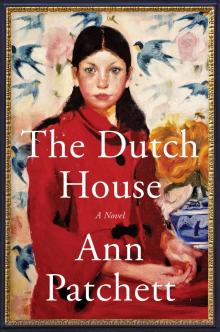 The Dutch House
The Dutch House Bel Canto
Bel Canto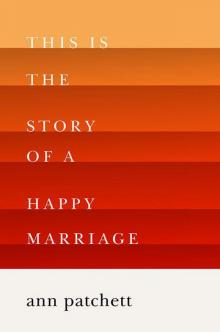 This Is the Story of a Happy Marriage
This Is the Story of a Happy Marriage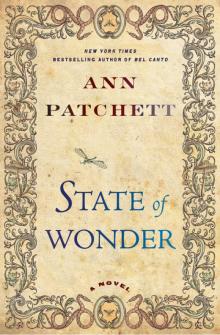 State of Wonder
State of Wonder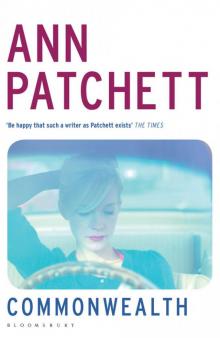 Commonwealth
Commonwealth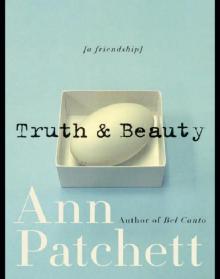 Truth & Beauty: A Friendship
Truth & Beauty: A Friendship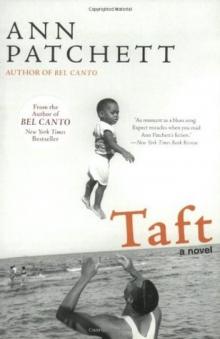 Taft
Taft What Now?
What Now?